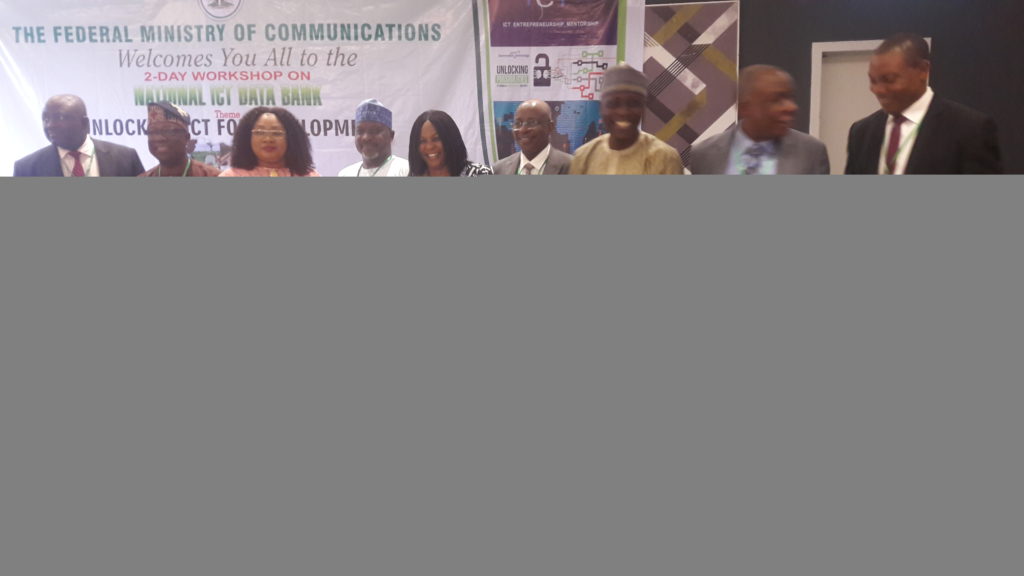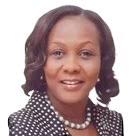…Say Data Is New Oil, Let’s Harness It
By Aaron Ukodie
The Ministry of Communications has continued to address certain gaps and seek redress in Nigeria’s effort to key into the global ICT revolution ecosystem and make it a compliant nation.

While on Tuesday and Wednesday it addressed the need for a policy formulation around mobile big data and setting up of an agency to collate, aggregate and provide analytics for mobile big data, on Thursday the ministry took on the issue of general ICT data bank and the need to provide a framework for its development and unlock its uses for Nigeria’s benefit.
As it was on the first two days, several agencies involved in ICT development and applications showed up to provide insight and offer solutions on how to achieve the Ministry of Communication’s yearnings.
As with several other meetings these days around Nigeria’s place in the ICT ecosystem, the participants raised fears around several issues that exist in the country’s ICT development efforts and called for urgent redress.
They sounded a note of warning about the danger of foot-dragging in keying into the fast-paced emerging 5th revolution, which is being built around big data, artificial intelligence, internet of things and 5G, demanding that certain steps be taken urgently, noting that Nigeria has not fully harnessed the vast opportunities which fast-passing away 4th revolution unleashed.
Monilola Udoh, Director of ICT at the Communication ministry, who stood in for permanent secretary, Musa Instifanus, raised the first concern. “5G is phenomenal. I am scared of it”, she says.

She said countries that have taken advantage of ICT have strategies, blueprints and standards and Nigeria which generates huge data, more than several countries, has no reason not to key into the global practice.
“It is big data that is driving the 4th revolution. Why are we not leapfrogging in ICT development in Nigeria? Nigerians are among those who are providing the solutions that are lifting other countries from their challenges, why are we not taking advantage of them?” she queried.
There is need, Udoh said, for Nigeria to have data identity, “if we have that we will solve the security problems by 50 %. If we deploy ICT appropriately we will solve corruption, we would be able to see who is doing what”.
She said apart from Nigeria having abundance of corruption and poverty, the country also have abundance of brains and resources, adding Nigeria needs to get the equation right in massive infrastructure investment and get requisite education and skills while eliminating corruption.
Big Data is the future and the time for the conversation is now and no nation develops without the right data and we therefore need to look at the application of Nigeria’s huge data for national development, says Gbenga Adebayo, Chairman of the Association of Licensed Telecom Operators of Nigeria (ALTON).
While acknowledging the role of the Ministry of Communication in driving the conversation around harnessing and utilizing big data for national development, Adebayo called for the need for ICT infrastructure to be protected as national security and economic infrastructure.
Representative of Rack Centre Managing Director, Tunde Coker, argued for the need to invest in data centres and ensure that such centres are not compromised and there is adequate connectivity, because if it is compromised business suffers.
She said Nigeria must do all it takes to redress the issue of the on-going brain drain of ICT skill workers, who are leaving, according to her, in droves to Canada.
Workshop coordinator, John Eweama said the poor availability of indicators due to inadequate data was affecting Nigeria’s rating in the global competitive index and direct foreign investment inflow, because many of the indicators do not really reflect the position of Nigeria.
While a lot was going on in the ICT sector, much of it was still in silos and some data projects are also duplicated and there was now need for their integration, he said.
Eweama also noted that the flow of data across silos or MDAs is poor and inadequate, as there are lack of awareness of data banks in the various silos for those who need them to access and use them.
He noted that there are various independent people and agencies who are harnessing and franchising the available data and if the federal government does not step in now there would be no more data to own, as much of it would have been franchised.
In an address which she read on behalf of Istifanus, the Permanent Secretary, Udoh said the meeting was the first to address use of ICT data for national development; to address the lack of adequate ICT data in the country and how to use it to fast-track Nigeria’s economic recovery and growth and for policy formulation and decision making.
According to him, one of the steps the ministry took was to set up the National ICT Data Bank, as a single window for accessing ICT data in the country. Istifanus wants ICT stakeholders to be aware of its existence and help in its content development.
He said beyond the storage and dissemination there is need to address the data strategy in the sector and how to make available credible, reliable and cost-effective data for the development of Nigeria, generate the data in orderly form, storing it and how to now deploy it for development.
Istifanus said the National Data Bank and ICT data development would reduce poverty, increase ICT investment and job creation.
The ministry of communications has expressed its vision to make Nigeria a centre of excellence in the production of ICT sector data and indicators through adherence to international best practices, its document on proposed strategic framework for ICT Data Development shows.
It also wants to produce comprehensive, reliable and timely ICT data and indicators statistics that will help users make evidence-based decisions as well as support management and development initiatives in the sector.














